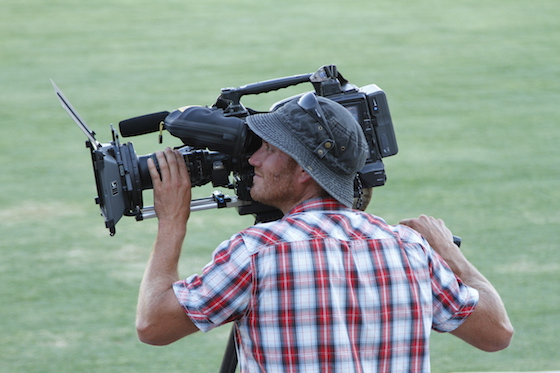It’s a great weekend for sports fans with Test cricket and the Lions crunch match against New Zealand – but could the stranglehold of Sky Sports and BT Sport be on the wane? One DMU expert believes so...A Netflix-style revolution in the multi-billion pound world of TV sports rights could challenge the supremacy of the big-beast broadcasters, a media expert from De Montfort University Leicester (DMU) has predicted.

The longstanding dominance of major players like Sky could be broken by a dotcom upstart that kills off the cut-throat battle for exclusive rights to screen Premier League football and other major sports, believes
Dr Paul Smith, Senior Lecturer in
Media and Communication at DMU.
Satellite and cable broadcasters have maintained an iron grip on the rights to show top-flight football matches since the dawn of the Premier League era.
Each expired contract sparks a furious bidding war from rival media firms, with deals secured for staggering sums. But Dr Smith said the broadcasting equivalent of a giant-killing in the cup could bring all that to an end.
“The whole premise of the sports rights market is based on exclusivity,” he said. “That’s what has ratcheted up prices. But is this the end game? Are we moving towards the end of exclusive deals? Are we moving towards the situation the music industry faced where if you don’t make your content affordable and accessible, then consumers will find other, not necessarily legitimate, ways to find it?
“All the insider talk asks if there is going to be a Netflix for sport. Will the idea come from Sky or TV? Or is it going to be more likely from the likes of Amazon or Twitter? That’s what started to happen in the US with the NFL.
“This hasn’t reached the UK yet, but in the States and Europe, there’s a battle going on between established broadcasters and the new players.”
Dr Smith, who has just won the ‘Best Article of 2016’ prize for a paper in the European Journal of Communication, said the unbridled inflation in the sports rights market has turned economic wisdom on its head – and warned it’s not just fans who have paid the price.
“We’ve been told since the Thatcher era that basic economics means that when you get competition, then prices for the consumer should go down,” he said.
“But here’s the paradox. In the area of sports rights, increased competition has not produced better deals. There’s more to watch, but we are paying a huge price for it.
“That was the starting point for my research: How come increasing competition leads to higher prices?
“It’s important even if you’re not interested in sport because the price you are paying for your broadband is being increased because of the spiralling cost of sports rights.
Pay-TV broadcasters are spending so much on sport to keep hold of subscribers, prices are going up for everyone. It’s been called the football tax – and you don’t need to have interest in football whatsoever to end up paying it.”
RELATED NEWS:*
Take a virtual tour of DMU from your laptop*
Losing Mel and Sue could be recipe for disaster predicts TV expert*
Media and Communication students lands digital comms roleDr Smith said the rise of illegal streaming sites appears to have torpedoed the ratings for broadcasts of major sports.
“It’s hard to reliable data on how much illegal viewing of sports content is occurring,” he said. “We can say with some certainty that among the younger, tech-savvy sports fans, there’s a fair amount of it going on. This year, the viewing figures for live Premier League matches have dropped by more than 10 per cent and similar trends have happened in the US with the NFL. It’s suspected at least part of the reason for that is a lot of viewers are now watching illegal streams.
“The question is: how do sport organisations respond to it?”
He said further regulation was needed to safeguard the sporting events which have so far evaded the clutches of satellite and cable firms.
“There is a need to preserve and strengthen the current listed events legislation which protects the crown jewels of British sport for free-to-air TV. The worry is, particularly with Brexit, that this legislation operates on a European level. What is there to stop – say – a company in Luxembourg broadcasting the FA Cup Final? I’m sure it’s not the number one priority for Theresa May but there’s a danger on the horizon.”
Dr Smith, of the Cinema and Television History Centre at DMU, was the lead author of ‘The Next Big Match: Convergence, Competition and Sports Media Rights’ which won the European Journal of Communication Article of the Year Award for 2016.
“I’m really happy with it,” he said. “It is one of the leading journals in the field. Getting a piece published by them was one thing, but for it to win Article of the Year was a really pleasant surprise.”
Posted on Friday 7 July 2017